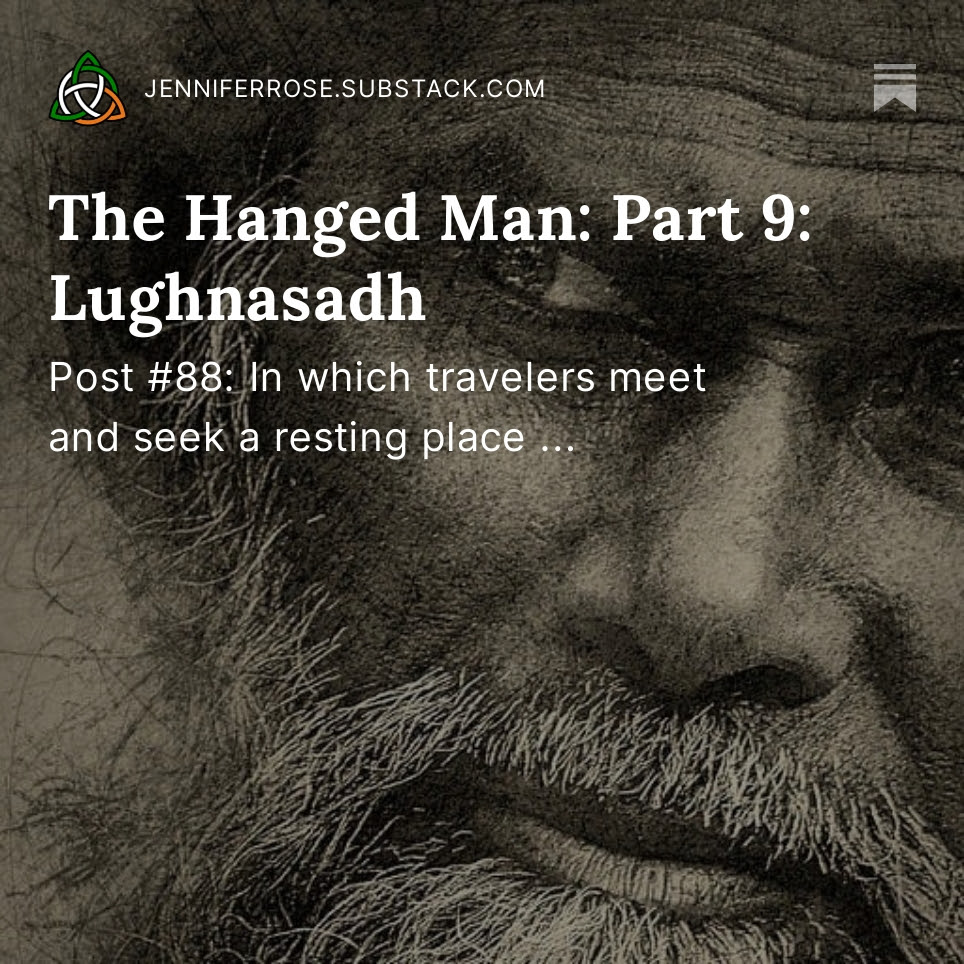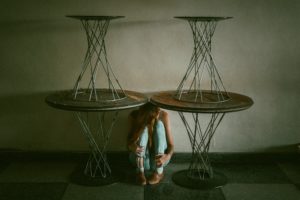by Jenny Rose | Oct 7, 2023 | A Flourishing Woman, The Journey
This post grew out of two seeds. The first was a piece by a substacker I follow who heard a phrase on a podcast about pleasure in discipline. It struck her that she’s good at finding pleasure in discipline (think productivity), not so good at being disciplined about pleasure.
This struck me, too. I’m quite disciplined when it comes to achieving goals and being productive, but it never occurs to me to apply that same discipline to pleasure. What a thought! How lazy. How irresponsible …

By Veljo Milic on Unsplash
Amused at my internal horror, I played with this idea for a day or two. Discipline is like a doorway, I mused. One can walk through it and into pleasure. Being a strong adherent of Work Before Pleasure (even though I know the work never ends), the doorway metaphor seemed appropriate. For a minute. Until I realized standing in the doorway of discipline, unable to move forward into pleasure, is no good, either. And that’s mostly what I do.
Sigh.
Then, I did my Mabon Tarot spread. I do this at every turn of the wheel. Mabon is Fall Equinox. It came and went while I was wading through paperwork, documents, emails, insurance, retirement investments, and the business of changing banks, cards, automatic payments, and transfer networks.
Did I mention paperwork?
Anyway, I did eventually get to pulling cards about a week after Mabon. The last card of the spread, the “overall outcome” card, happened to be the 9 of Stones (my deck), or the 9 of Pentacles (classic deck). In my deck, this card is the card of tradition, signifying reverence for past wisdom and sacrifice, and ancestral memory.
It stopped me in my tracks. Ever since my mother died in August (hence the endless paperwork), I’ve been preoccupied with family, past and present, living and dead, known and (mostly) unknown. Managing my inheritance has been fraught with guilt, shame, anguished memories, bewildered pain.
I don’t feel reverence. Whatever I feel, it’s not that. (Another thing to feel guilty about.) Whatever happened in my past context of family, I’ve found no wisdom in it. Plenty of sacrifice, though, mostly of and by me.
In the five days since I turned this card over, I’ve been thinking about it. It’s the traditional time of year for many cultures to remember ancestors, the time when the veil between the worlds grows thin, the time when the trees release their leaves to decay and sleep before the next season of growth.

Photo by fancycrave on Unsplash
The discipline of pleasure. And the pleasure of discipline.
Reverence for past wisdom and sacrifice; ancestral memory.
I suddenly remembered an old story I used to tell during this time of year, “The Corpse Bride.” It’s a story out of Jewish tradition. A corpse bride, still wearing her wedding finery, mourns her violent death as she was on her way to her wedding. She grieves for her lost opportunities. A living bride comforts her, vowing to fully experience all that the corpse bride dreamed of and lost. The corpse bride is then able to lie back in her grave and rest in peace.
These pieces seemed to answer a question I haven’t consciously asked. Discipline. Pleasure. Unquiet ancestors. Lost opportunities.
How do we connect with our ancestors in a healthy way? We’re only just beginning to understand epigenetics and the ways in which we’re linked to the generations who came before us. I know something about my DNA, but almost nothing about ancestors. When I think of ancestors, I think of a dignified group of people, wise, healthy, connected, at peace. When I think of my family, I think of rejection, dysfunction, and abandonment. I hardly knew my family, even the ones living during my lifetime. What I mostly knew was I didn’t belong, though I was a biological child of the people I called Mom and Dad.
I feel no connection to ancestors. My unconscious assumption is they wouldn’t want me any more than the family I knew did.
However. The fact is I do have blood ties and a biological family tree, as we all do. I have inherited certain characteristics, behaviors, weaknesses, strengths, and wounds through epigenetics as well as genetics and environmental factors. I am now a twig at the end of a branch on the family tree. Neither of my sons have children. I have no daughter. My two cousins are also childless, as is my brother. I am the last female in the last generation of my direct maternal line.
Me. The highly sensitive, passionate, sensual, creative, noncompliant one nobody wanted!
I dealt several Tarot cards of healing and recovery in that Mabon spread. Perhaps they’re not solely about my healing. In conjunction with the season and this powerful card of ancestry, perhaps I have an opportunity to heal myself and comfort? give peace to? palliate? propitiate? the women who came before me, the women who gave me life.
Whatever came before, I’m here now. I breathe. My heart beats. Half the family resources are in my hands. I have the power to make choices. I choose to continue forward into generosity, healing, and joy. I don’t have ancestral traditions or maps. No one ever gave me a map, because they didn’t know the way themselves. Maybe they didn’t want to go in that direction; maybe they stopped looking for the path. It doesn’t matter now.
What matters now is to live … because they can’t. Like the corpse bride, their earthly opportunities are lost. Maybe from the very beginning I was the one with the potential to bring my female ancestors peace at last, not because I complied with their oppression, but because I refused it. Maybe it’s my wisdom that’s needed, the map in my pocket we all must follow.
The women of my family taught me some of the pleasures of discipline. Perhaps I must teach them about the discipline of pleasure, of joy. Which means I must learn it myself first.
I swam yesterday. I’m required to train weekly for my lifeguard position, but that’s only a good excuse. I swim for pure pleasure. I relished every sensual detail, every rhythmic breath, every stretch and flex of my muscles, the silk of the water. I relished the hot shower afterwards, the long drink of water I took, my clean hair and warm and relaxed body. Because they never did, even when alive. Because they never can.

Yellow Boots
This Saturday morning I ran to the store. I took a deep lungful of the grey, humid air, heavy with the promise of coming rain. I savored it. I chatted with the cashier. I bought myself a luxurious dark chocolate bar. I deliberately splashed through a puddle in the parking lot with my bright yellow duckie boots. I smiled at strangers. I drove home with the window open and the damp air stirring my hair. Because they never did these things. (Well, maybe the chocolate. Mom did like chocolate.) Because now they never can.
I sit here on my couch with the cats, the laptop on my lap. I’m burning a scented candle, surrounded by a couple of sleeveless summer shirts I just bought on sale, my journal, lists, notes, the mail. I’m at peace. I don’t have pain. (Mom always had pain.) I’m content. I have friends I love and who love me. Life is good, filled with projects and plans. In a few minutes I’ll get up, put some laundry in, wash the dishes, stand in the doorway and look at the sky, feel the air stirring as the storm approaches. I won’t do these things because I’m disciplined and productive, or because I must, but because I can. I want to. I choose to. These are the small tasks of my life, and I love my life.
All these I’ll do for myself, and also for them, my ancestors, the women who came before me, my blood, my bone, the wombs who gave me life. Because they can’t.
They’re gone. (May they rest in peace.)
But I’m still here.
Questions:
- What does the word ‘ancestor’ mean to you? Do you connect it with a real person in your life?
- Are you prepared to be an ancestor? What wisdom would you pass on to younger generations?
- Do you feel connected to the generations of family before you?
- Would you like to be more deeply connected to living family members? What’s in your way?
Leave a comment below!
To read my fiction, serially published free every week, go here:
by Jenny Rose | Feb 28, 2019 | Power

Photo by Chris Kristiansen on Unsplash
I think of myself as a goal-oriented, disciplined person. Most of the time I know what I want (at least I think I do). Some of the time I’m intentional and present with my choices. I like routine and can be both dogged and stubborn.
Outcomes have always been important to me. I set my sights on what I want to happen and started trying hard to achieve that desired outcome.
I don’t remember ever being taught creating certain outcomes is the way to live successfully and happily, but I structured my choices and behavior around that belief. A desired outcome was success, and therefore good. An outcome I didn’t want was failure, and therefore bad.
I didn’t consciously notice for much of my life that trying to create just the right outcome never worked well for me.
When I came to Maine and learned emotional intelligence, I started thinking about personal power and I finally really looked at how strongly desired outcomes motivated me. I was furious when I first came across the idea of letting go of outcomes. What I heard was invalidation and rejection of my ability to make long-term goals and plans and steadily, a step at a time, work toward them. I also thought I was hearing it was inappropriate to have dreams and desires. How could one navigate through life without caring about outcomes?

Photo by Jeremy Bishop on Unsplash
It took time, a lot of exposure and a couple of difficult and painful events, but eventually I understood investment in outcomes was the problematic piece, not having needs and desires or the degree to which we are disciplined and can tolerate delayed gratification.
We do not have complete power in the way things work out because our goals and plans inevitably include others.
By others I mean other people (the job, college or mate we want), whatever our conception of the Divine might be, and influences like the weather, the stock market, the tax return we counted on, the housing market, the weather, our state of health, and a thousand other variables.
Outcomes are as unpredictable as a loose cannon on a rolling deck, yet I based my happiness and sense of worth on them for most of my life.
For the most part I was unhappy, anxious and felt like a failure.
Then, somewhere I read or heard this little phrase: “However it needs to be, it’s okay with me.”
When I first came across it, I felt angry. It was a blatant lie. I was reluctant to think it, let alone say it. On the contrary, I was deeply invested in outcomes.
But I kept noticing it didn’t work well to live that way.
For some time I watched myself using all my energy in the tension of trying to create specific outcomes that eluded me.

Photo by Talles Alves on Unsplash
In my usual buttheaded fashion, I hung on grimly. If I wasn’t seeing the outcomes I intended and wanted, it was because I didn’t deserve them. Or I didn’t work hard enough. Or I was so broken and stupid nothing would ever work for me. Or the world was against me.
It was much easier to hate myself, an old habit, than consider the possibility none of us can really control outcomes. It was easier to blame others than change myself.
What we can control – the only place our personal power resides – is what we do with ourselves in terms of our beliefs, choices and behaviors.
Deciding how to think about outcomes is part of our personal power.
I formed a conscious intention of experimenting with letting go of outcomes. One of my very first explorations into that was this blog.
One of the biggest problems with attachment to outcomes for me is the outcome looms so large it overshadows the hundreds of small pleasures in life, as well as my delight and curiosity in the journey I take through each day. I’m too busy trying to get to an outcome to notice or appreciate anything else. Attachment to outcomes means there’s only one very specific way I can feel successful or happy, and in order for that to happen all the stars must align just right and everyone and everything around me must behave exactly as I want them to. Otherwise I’ll be resentful, depressed, discouraged, hurt, or some other kind of miserable.

Photo by Alex Iby on Unsplash
Attachment to outcomes is also a relationship killer. Whatever it is we want our children, parents, spouses, colleagues, bosses and friends to do or be (or not do or be), the fact is they are not pawns on our chess board. They are not paper dolls. They are not (hopefully) ours to control.
If we cannot accept our loved ones (or ourselves, for that matter) for who they are, we will lose them.
Attachment to outcomes comes with a heavy burden of fear and anxiety. As long as an outcome is “good” or “bad’ in our minds, both hope and fear attach to it. We invest energy in trying to avoid certain events and foster others. We try to figure out how to manipulate and influence the situation so it turns out the way we want.
We lose sight of the others around us very quickly. If we have our hearts set on a job, for example, even though we’re not well qualified for it, we do whatever it takes to get hired, never considering someone else might be a better fit. Someone else might be more desperate than we are for the job. The organization might need a specific set of skills and talents we do not possess. Another job opening we’re not yet aware of might be the place we’re most needed and will be most happy.
Attachment to outcomes can make us small and rigid, selfish and resentful.
So what does it look like to let go of outcomes?
Change and the unexpected are no longer fearful, but interesting. We make space for them. We have increased room for others because we’re not trying to control them. We take life less personally. We are confident and clear in our own power.
To let go of outcomes is to let go of distractions. It frees up space and energy to consider our own integrity, expression and needs. If we want to give a gift, we do it without worrying about how it will be received, if it will be reciprocated or how it will be judged. We give because it makes us happy and gives us pleasure to do so.
If we are artists, we create because it gives us joy, because it’s what we were born for. We don’t use our talent as a tool to leverage fame and riches. That doesn’t mean fame and riches won’t come or our art is not worth getting paid for, it just means that’s not an outcome that drives us.
Letting go of outcomes means letting go of feeling victimized, resentful and betrayed. We don’t take disappointment personally. Life is not all about us.

Photo by rawpixel.com on Unsplash
Letting go of outcomes makes room for cooperation and collaboration. We see others more clearly, lovingly and respectfully. We’re a more elegant team player. We enjoy working with others without the need for competition or power and control. We look for ways to share and nurture power. We give up the blame and shame game.
Letting go of outcomes means letting go of regrets. We make space instead for all outcomes, whether intended or not, comfortable or uncomfortable. We go forward with our best, most honest and heartfelt effort and have fun, letting the rest take care of itself. We use our time and energy to cultivate curiosity, wonder and gratitude for whatever happens.
Letting go of outcomes starves our anxiety, depression and insomnia. If we can position ourselves in life with confidence, surrender and acceptance, we build resilience and joy.
Let me hasten to say releasing outcomes is hard work. I find, somewhat to my chagrin, at times I’m invested in my resentment over the way things work out and my sense of betrayal. I don’t want to be soothed, comforted, or challenged to consider my experience from a different perspective. I want to be left alone to suck my thumb and pout, my version of a tantrum. Managing my expectations and attachment to outcomes is a work in progress.
I also do not deprive myself of the pleasure of making and achieving personal goals having to do with exercise, building skills, playing, relaxing or learning new habits. Those kinds of outcomes are well within my power to pursue.
When I feel frustrated and as though nothing ever works out for me, I’ve developed the habit of saying aloud to myself: “How ever this needs to be, it’s okay with me.” If it feels like a lie in my mouth, I start poking at the situation and asking myself why I’m attached to a particular outcome. I put my energy into taking a step back and reevaluating the situation until I really am okay with whatever outcome occurs. I summon my curiosity, warm up my gratitude, invite my sense of humor to awaken and go forward.
It’s the difference between rolling out of bed and telling the day how it must be in order for me to be happy or rolling out of bed wondering what the day will bring and choosing to enjoy whatever that is in advance.
It’s the difference between arguing with what is and acceptance.
It’s the difference between feeling disempowered and standing firmly in my own power.
However I need to be, however you need to be, however this day needs to be, it’s okay with me.

Photo by Dan Gold on Unsplash
All content on this site ©2019
Jennifer Rose
except where otherwise noted
by Jenny Rose | Apr 13, 2017 | Emotional Intelligence, Fear, Feelings
Last week I came down the steep stairs from my little attic aerie, sat in a chair in the living room and cried while I asked my partner if he thought I would ever have a less effortful experience of life.
It’s not that anything was really wrong. What I was feeling was an old, familiar feeling of trying to manage my life and myself as efficiently as possible and feeling worn out and unsuccessful.

Photo by Bradley Wentzel on Unsplash
Trying. Manage. Efficiently. What am I, a machine?
I was tired that evening, and worried about diminished workflow and subsequent diminished paycheck. I wasn’t seeing a way out of my work/income situation, which is a place I’ve been in for several years.
One of the things I did last week during a work shift devoid of work was join She Writes, an online community for, obviously, women writers. I’d been procrastinating about doing so for a long time.
For years, I’ve been trying to find a writing community, both locally and online. I’ve joined a professional local organization, but their programs are rarely offered up here in Central Maine, as Portland is their headquarters. I’ve tried, unsuccessfully, to find beta readers for my first book. I put up an invitation to start a writer’s group at the local library and didn’t get a single call. I tried a give and take partnership with another writer so we could read one another’s work and provide feedback, but my partner had other priorities and needed to drop out.
And, of course, I need to work for that paycheck, so my time and energy are largely gobbled up by my financial needs rather than the joyful work of my life. This produces a chronic background tension that grinds away at my soul.
Anyway, I decided the time had come and I was ready to join She Writes and see what possibilities might open up through that community. I had to apply to join.
I knew they wouldn’t take me.
They accepted me (probably some kind of mistake) and the day after I sat in the chair and cried, I had another shift with no work and began exploring She Writes. I came across a blog post titled “The Only Reason to do Anything is Love,” by Bella Mahaya Carter, and had an epiphany.
Engaging with life from a place of love rather than fear is not a new idea for me, or probably for anyone reading this. It’s the kind of thing we hear and read all the time. I would have said I do that. It’s always my intention to show up in the world with love, which is to say kindness, compassion and respect.
The wording of Carter’s post, however, indicates motivation, an internal thing, not external action. Make choices with love, not fear. Decide what to do based on love. Do nothing for fear.
Right, I thought. I treat others and myself well. Of course.
Why?
I treat others well because I think it’s effective and I’m afraid of violence, hatefulness, rejection and just plain crazy.
I treat myself well because I’m afraid to be unhealthy, unable to earn a living and/or unable to be independent.

Photo by Milada Vigerova on Unsplash
It’s all for fear. It’s not for love.
Furthermore, treating myself well doesn’t equal loving myself. I caretake my physical form like a good property manager takes care of a rental. I exercise, eat well, brush my teeth, wash my body and take care of injuries.
What I think about myself is that I disappointed my parents, drove my brother nuts (not literally!), failed two marriages and made unforgiveable mistakes as a parent. I think I’ve never made a successful career or had a good enough job. I think I’m ridiculously hard to live with. I think I eat too much, use too much hot water in the shower, like obnoxious music, try too hard and am too sensitive. I think I’m unattractive and few people want to hug or touch me. I think I’ve spent years writing a 300,000-word book that, for all I know, has less value in the world than a roll of cheap toilet paper. On sale.
Those are some of the things I’m conscious of. When I look at my fear-based choice making, it appears I also think if I don’t hold my own feet to the fire at all times I’ll become a lazy, irresponsible, selfish slacker; demanding, mean, dishonest and greedy.
Carter’s post made me realize I could hardly think of a choice, any choice, whether important or mundane, that I haven’t made based on some kind of fear. Ever. From earliest memory.
The greatest motivator in my life is and has always been fear.
Not only that, but I’ve created a whole pantheon of idols I obsessively and ceaselessly worship in order to avoid the vengeful, punitive God I’ve made out of fear. I make daily bloody and brutal sacrifices of time, energy and life to appease them, but insatiable fear just gets more and more powerful. Here are some of the idols:
I read that post on Friday. There and then I decided to start making choices based on loving and believing in myself rather than fear of consequences and see what happened.
Without leaving the chair, I asked myself what the hell I was doing messing around with a job that wasn’t meeting my needs and I was unhappy in.
On Saturday I applied and tested for a job as an independent contractor to do transcription for an online company.
On Sunday I applied and tested for a job as an independent contractor to do transcription for a second online company and was hired on the spot. I also wrote the publisher of She Writes Press and asked for help with the next step for my book manuscript.
On Monday, when I ran out of work, I began getting qualified (via testing) to do various kinds of transcription through my new job and looked up the resignation process from my current medical transcription job.
Yesterday the second online business hired me.
This morning She Writes Press wrote me back with support, suggestions, a recommended professional who might read the manuscript, and what it would cost.
The fear is not gone. In fact, it’s louder than ever because I’m challenging it on so many fronts at once. The difference is I’m not standing nose to nose with it right now. Playing with the new toy of making choices based on what’s loving for myself gives me another option, which means now I can make a real choice.
Fear is not a bad feeling. We need it to survive. It’s just that mine has grown bloated and swollen on all the power I’ve given it over the years. The bigger it gets, the more space it takes. At this point I’ve become its thing. It thinks it can do as it likes with me.
It’s wrong.
I’ve had a belly full of life based on doing things out of fear. It’s exhausting, demoralizing, joyless and hag-ridden. It doesn’t work well and I’m sick of it. When I think about it rationally, I know I don’t need to beat myself with a stick through every day for fear I’ll become lazy, selfish, etc., etc. If I was going to turn into any of those things I would have done it long ago.
How would it be if I used regard for myself as a motivator and refused to do or not do out of fear? What might a life based on doing things out of thinking well of myself look like? What if I stopped giving anything to fear?
The funny thing is life looks much the same. The difference is largely in the outwardly invisible motivation behind my choices. Am I going to relax with music or a video and stretch because that’s the right and responsible way to treat my tiresome physical needs after a long day sitting in which I earned inadequate money, or am I going to do it because I love the way it feels after a tiring day in which I worked hard, whether I earned money or not?
Life is crazy right now. Everything feels like it’s in transition. I hardly know what to concentrate on in any given moment, there’s so much on the table. Even so, now when I run out of energy in the afternoon I spend a few minutes writhing between making a choice between demanding more from myself out of fear or doing something pleasurable and relaxing. So far, every day I’ve managed to choose rest and relaxation after another wild day.
It appears I’ve begun a new practice. I didn’t know that evening I sat in the chair and cried I was standing on an important threshold. I didn’t know by the end of the week I’d have not one but two new jobs. I didn’t know I was going to finally get serious about putting my manuscript into a professional’s hands and risk failure and rejection. I didn’t know in just a couple of days I was going to begin making a habit out of rolling out of bed and stepping into the day’s embrace with curiosity and a resolve to think well of myself as I navigate, rather than wondering fearfully what would happen next and whether I would manage it adequately.
So far, so good.
Nothing more for fear.

Photo by Stephen Leonardi on Unsplash
All content on this site ©2017
Jennifer Rose
except where otherwise noted











